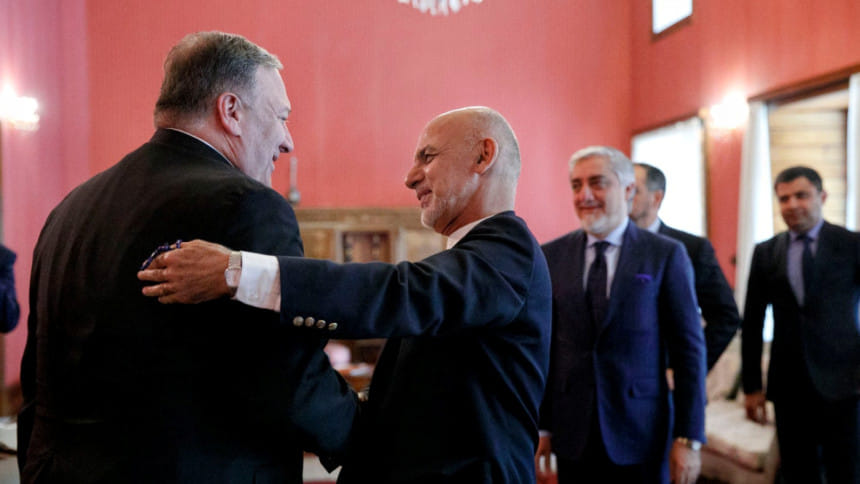The US is making a historic mistake once again in Afghanistan

In the late 1980s, without ending the war, foreign troops withdrew from Afghanistan, which prolonged the conflict for three decades. Similarly, US President Donald Trump is now keen to fulfil a 2016 campaign promise to pull out the remaining 13,000 US troops from Afghanistan before the 2020 election. The current religious militancy in the country is not much different from the 1980s; the consequences of withdrawal would be similar too.
Afghanistan's communist government that came into power in 1978 under the presidency of Nur Muhammad Taraki, had close ties with the Soviet Union and soon after taking the reins of the country introduced social reforms. The reforms incensed the hardline Muslims and anti-communist population and turned them against the government, which finally triggered the Mujahideen insurgency.
In late December 1979, the Soviet Union invaded Afghanistan with 30,000 troops to protect the newly-established pro-Soviet government and its interests. The soldiers quickly took control of the major cities and highways. On the other hand, the Mujahideen, which was also supported by certain foreign powers to counter Soviet communism, started fighting against the Soviet forces. Violence escalated manifold, and in the vicious nine-year war, around one million civilians were killed.
However, Soviet leader Mikhail Gorbachev decided to end the occupation of Afghanistan when he became General Secretary of its governing Communist Party in March 1985, and later urged Afghan officials to settle the issues with the conflicted groups. Finally, Afghan President Dr Najibullah announced a National Reconciliation Policy in 1987, invited the leadership of the Mujahideen, and offered to make them autonomous rulers and remove Soviet troops from their territories if they made peace. However, the opposition leaders rejected the government's proposal and pledged to continue the jihad till the complete withdrawal of Soviet troops and the end of the communist regime.
At last, in 1988 the Geneva Accords were signed by Afghanistan, Pakistan, the United States, and the Soviet Union for the settlement of Afghanistan and the withdrawal of Soviet troops.
The reconciliation plan failed due to the earlier announcement of the withdrawal of troops by the Soviet Union, which gave the Mujahideen no reason to make peace. The fighters realised that they had defeated the superpower, and hoped the Kabul government would fall instantly after the withdrawal of foreign troops.
As the Soviet left Afghanistan, the US also lost its interest in the country without installing its nominee in Kabul and ending the jihad. Owing to the Mujahideen's continued war, the government collapsed in 1992. Afghans lost the opportunity of peace.
After that, the various Mujahideen factions fought against one another across Afghanistan for gaining government and key posts; consequently, the insurgency transformed into a civil war.
Around, 10,000 individuals were killed in 1993 alone. Amidst the chaos of civil war, the Taliban emerged in 1994 with the help of regional powers, overthrew the Mujahideen government and captured Kabul, which ultimately prompted the 9/11 attacks.
After the 9/11 incident, hopes of peace increased among Afghans when the US and its allies invaded Afghanistan, toppling the Taliban with the cooperation of the Northern Alliance within three months. However, a few weeks later, when the Bonn conference was held in Germany in December 2001, for peace and Afghanistan's future, the Taliban was not included. The then US Ambassador to Kabul, Ryan Crocker had previously declared that there was no place for the Taliban in Bonn. Though the "losers" of war, the Taliban were ready for dialogue; but the Bonn Conference brought together just the "winner" of the war.
Underestimating the strength of insurgents and their attachment with the regional powers was a mistake of the US. The Afghans did not only miss the opportunity for peace once again, but the US also failed to change its early military victory into a political victory in the last 18 years and fought the longest war in its history.
The attention of the US diverted from Afghanistan in 2003 when its forces invaded Iraq, which then became the key US concern. In May 2003, Donald Rumsfeld, the US defence secretary, claimed that most of Afghanistan was secure and announced an end to "major combat activity"; he also set a timeline for troop withdrawal: within the next twelve months.
The statement paved the way for the return of the Taliban. After resuming attacks on US bases and government buildings shortly after the Rumsfeld proclamation, the Taliban realised that the US was tired of war.
Last year, the US started peace talks with the Taliban after 17 years of war. Fatalities in Afghanistan, as of October 2018, stood at about 147,000, between 2001 and 2018.
Currently, the Taliban is celebrating their triumph and believe that the Muslims of Afghanistan have defeated three superpowers in the past two centuries: Great Britain in the 1920s, Soviet Union in the 1980s and now the US, which the Taliban thinks is on the verge of defeat.
The Taliban increased attacks immediately after they pledged to the "roadmap for peace" in Afghanistan to avoid threats, and say they will continue fighting against the Afghan government after the deal with the US to seize power. Now, their strategy appears to have convinced the US to accelerate withdrawal of troops, and then attempt to overthrow the government.
In these circumstances, instead of strengthening focus on Afghanistan, Trump looks desperate to fulfil his campaign pledge and has told his five advisers that he wants to pull all US troops out of Afghanistan before the November 2020 presidential election. The withdrawal of troops maybe advantageous for Trump's next election campaign, but it will usher in another phase of civil war, like the one that the Afghans saw after the Soviet Union pulled out its troops decades back.
The US should be cautious about the insurgents' motives behind ending America's longest war. It will be a historical mistake committed by the US if it withdraws troops without a permanent resolution to the problems.
Hizbullah Khan is a Pakistani journalist and political analyst. He writes about South Asian political and security issues.

 For all latest news, follow The Daily Star's Google News channel.
For all latest news, follow The Daily Star's Google News channel. 



Comments